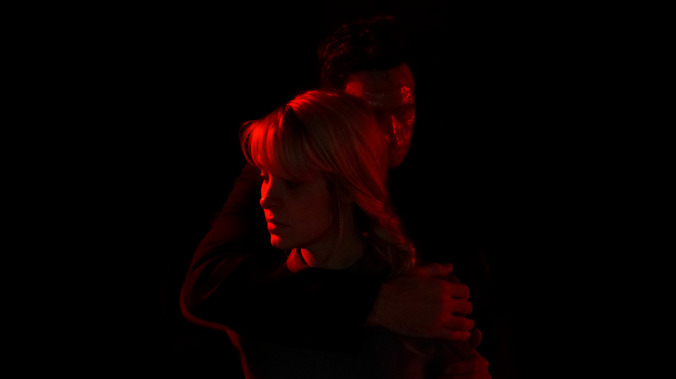Killer jeans, organ traffickers, and sex with a carnival ride at the Fantasia Film Festival

As we laid out in our first dispatch from the Fantasia Film Festival’s virtual 2020 edition, conducting coverage of this particular month-long event from home isn’t all that different from usual. All you have to do is take out the international travel (undoubtedly a bad idea, even if it were possible), the in-person camaraderie (again, ill-advised), and the electrifying buzz of excitement that passes through a crowd when the lights go down in a packed movie theater (technically possible in some places, but a mixed proposition at best). Covering a film festival is never anything to complain about, of course, even when it doesn’t double as an excuse to leave the house. But what can we say? We’re feeling a little wistful after all these months.
But while the prevailing narrative throughout the COVID-19 crisis has been about what we can’t do, there have been some small but positive developments floating in the dirty-dishwater torrent of bad movie news. Namely, the lack of blockbuster tentpoles opening in theaters has freed up a lot of bandwidth for both critics and viewers to pay attention to smaller films. And because of the entrenched sexism of the industry, women filmmakers are more likely to work in the realm of documentary and indie films—the same “smaller films” that are having a moment right now. Would She Dies Tomorrow, Sea Fever, or Miss Juneteenth have gotten as much attention as they did if there had been major-studio releases opening those same weekends? Almost certainly not.
And with major studios shuttered for the foreseeable future, there’s an opening for more modest productions to step forward and command the attention of a viewing public in need of a good distraction. Several of the films covered in this week’s Fantasia dispatch have already been picked up and scheduled for distribution in North America, and while movie theaters are beginning the process of opening their doors in the U.S., like we said, your mileage may vary on whether you think it’s worth it to go out to the movies any time soon. And the fact that all five of this week’s selections were directed by women? That just shows the possibilities of this unprecedented new world.
You may know Noémie Merlant as the painter of Portrait Of A Lady On Fire, and the French actress embarks on another forbidden affair—albeit, one of a more bizarre sort—in her latest movie, Jumbo (Grade: B). The subject of Belgian writer-director Zoé Whittock’s debut feature is object sexuality, a rare sexual orientation where a person becomes romantically attached to an inanimate object—here, a Tilt-A-Whirl ride at a provincial French amusement park. That may sound like the stuff of exploitative TLC documentaries, but Whittock treats it as a character study rather than a sideshow, an approach that pairs with Merlant’s heartsick performance to empathetic effect.
Merlant stars as Jeanne, the park’s misfit night janitor whose previously dormant sexuality is awakened by the arrival of her neon-and-steel beau. Where Jumbo enters the realm of magical realism is that the ride seems to like Jeanne, too, coming to life when no one else is around to scoop her up for romantic spins through the crisp midnight air. There’s even a surrealist sex scene, pouring gallons of viscous oil all over cinematographer Thomas Buelens’ radiant color palette. Jumbo stands stronger as a concept and an aesthetic than it does as a narrative, but if nothing else, it’s certainly distinctive.
Jumbo screened on Friday, August 28 as part of the Fantasia Film Festival, with an encore screening planned for August 31. It will open in the U.S. in fall 2020.
On the reverse side, the script’s the thing in Lucky (Grade: B), an unsubtle but effective deconstruction of the double bind of being a “strong woman” in a society that doesn’t listen to what women have to say. Brea Grant, who also wrote the film, stars as May, a self-help writer whose latest book is called Going It Alone. That title turns out to be prophetic after May is randomly beset by an anonymous masked man who comes to her house every night and tries to kill her. The problem isn’t that May’s not capable of defending herself—she does, over and over, in bloody and sometimes ingenious ways—but that while cops, social workers, friends, and family all tell May how brave she is for fighting back, they also tell her that she needs to “calm down” because this is “just the way it is.”
Director Natasha Kermani plays up the surrealism of May’s waking nightmare through the actors, who deliver their pat clichés about strength and independence with glassy eyes and frozen smiles while Grant frays down to a jumpy live wire of personality. The self-help angle of the story isn’t as developed as it could be, given the potential richness of that material. But a bravura finale set in a purgatory of misogynist violence captures the fear of a woman walking alone—or driving alone, or sitting in her house alone, or doing anything alone—with a visceral bluntness that’s hard to deny. If you know someone who doesn’t quite grasp the emotional terrorism behind concepts like gaslighting and victim-blaming, sit them down with Lucky.
 Keep scrolling for more great stories.
Keep scrolling for more great stories.
